Genre: Romantic Comedy
Premise: With the future of Manhattan’s Chinatown at stake, a stubborn store clerk battles against an innovative CEO’s expansion plan, while both are unaware they’ve been falling in love with each other on a new, anonymous dating app.
About: This script finished on last year’s Black List. William Yu has written a couple of short films, one of which he directed.
Writer: William Yu
Details: 117 pages (!!)
 I don’t know who this is but she should star in this movie
I don’t know who this is but she should star in this movie
*****WE INTERRUPT THIS REGULARLY SCHEDULED PROGRAM*****
With White Lotus doing so well at the Emmys, I wanted to remind you of the ENTIRE WEEK I once took to praise this amaaaaaaaazing series. Here ya go!!!
Day 1
Day 2
Day 3
Day 4
Day 5
*****NOW BACK TO TODAY’S REVIEW****
As we continue this theme of ‘what makes good dialogue’ that I will loosely continue over the next few weeks in the lead up to the Scriptshadow Dialogue Book, I thought it’d fun to review a romantic comedy, a genre that is designed to showcase dialogue. I figured, good or bad, we could learn a thing or two about dialogue today. So let’s jump to it!
We’re in Chinatown, New York City. Sophia Chao is so focused on her “WeWork” like startup company that she hasn’t had a lot of success dating. Hence, she says “screw you guys, I’m outta here” (no, she didn’t really say this) and focuses on convincing three elderly store owners to sell to her so she can start building her “OpenSpace” headquarters.
The grandson of one of these owners is Brandon Wong. Brandon is Chinese-American and very adamant that big corporations are bad! Very bad! He spends a lot of time protesting and protecting the traditions of his hometown. When he learns that Sophia is trying to build a company on his street, he takes his protesting to the next level.
Now since both characters are sick of the dating scene, they start using a new anonymous dating app. No pictures. Just an algorithm that matches you up. In case you were wondering, Brandon and Sophia match and start chatting on the app. They don’t want to go on dates. They just want to chat on the app. And start falling for each other.
Then Brandon gets some bad news. His grandma actually wants to sell the store and move to Florida! If she does this, Big Bad Sophia will win and Brandon can’t have that. So Brandon makes his grandma promise to give him the summer to drum up business and start making some real money for the store. She reluctantly agrees and Brandon is off to the races, all while occasionally bumping into Sophia and having no idea she’s his online girlfriend.
Let me start off by saying the hoops we have to jump through to buy into this story are so high, they require the latest Air Jordans to reach. The writer needed a way to have these two date each other without knowing who the other was, so he set up an anonymous dating app with no pictures and then, even after they start dating, they don’t want to see each other, which, of course, is necessary, since the second they see each other, the plot doesn’t work anymore. It pummels the suspension of disbelief into submission.
I will say that I liked the choice to make the guy the local business owner and the girl the big mean CEO. That was different from what I’m used to seeing. But outside of that, I struggled to find things to celebrate here.
Let’s get to the dialogue cause that’s our focus these days. Here’s any early exchange where Brandon and Francis meet at a protest and debate the challenges of dating in the modern era. Brandon doesn’t do a lot of dating, which Francis takes exception with.
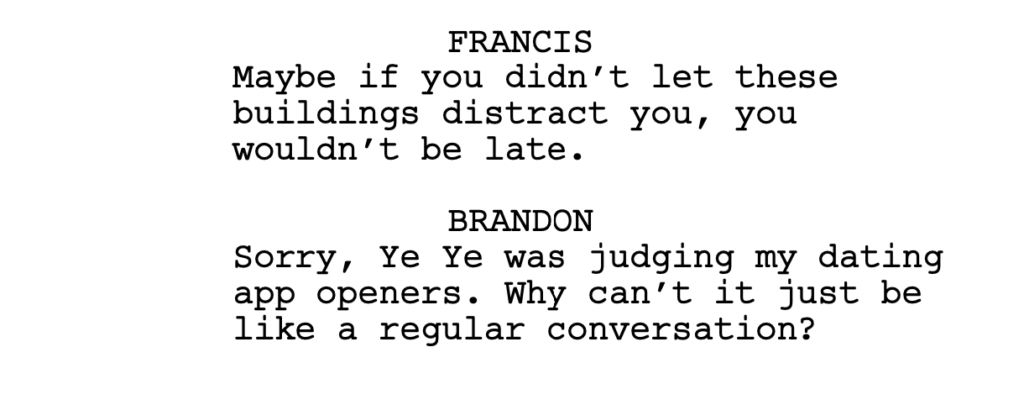
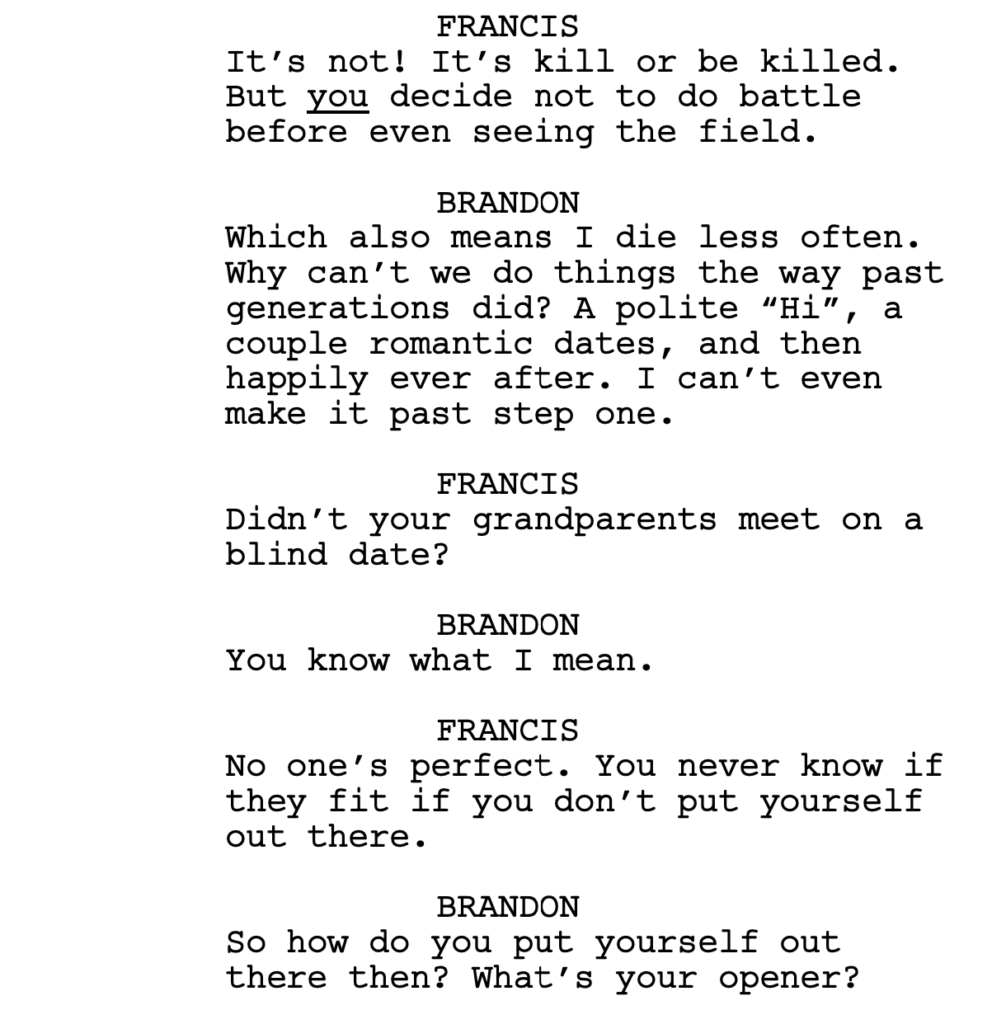
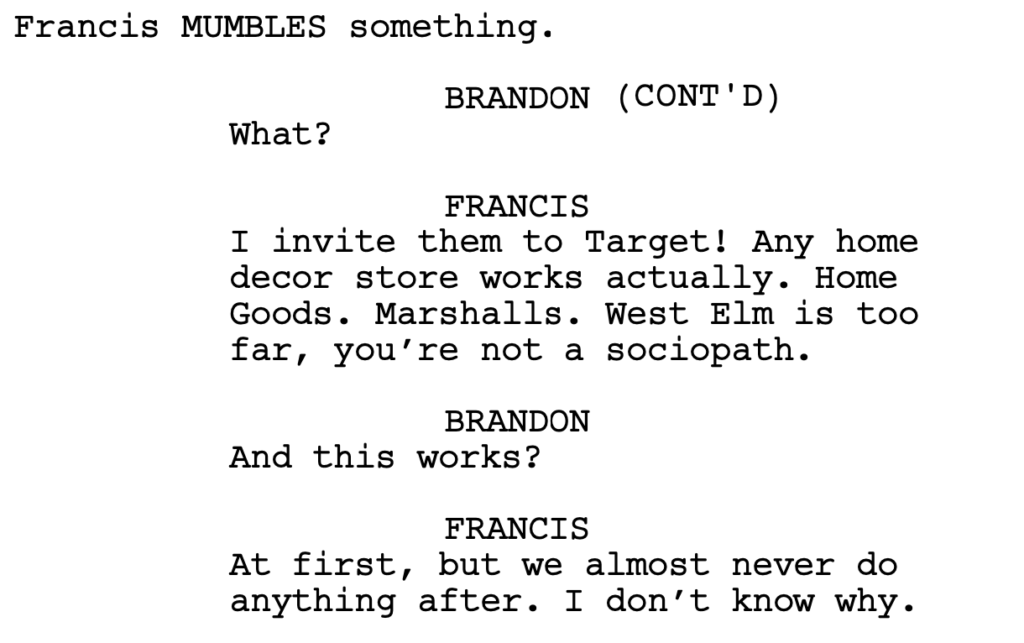
Okay so we start out with an analogy. And in my dialogue studies, I’ve realized that analogies can be a big asset in sprucing up dialogue. Everyone likes a good analogy. But here’s the rub. It’s gotta be a good one. And this one is okay, I guess. Comparing dating to war is something I’ve heard before so it’s not exactly a fresh take on the topic, which you would prefer your analogy to be. But it’s an okay start.
From there, we cover a little backstory. We introduce some character information, as we’re learning about Brandon’s dating past. But then we run into, “No one’s perfect.” This is such a boring common phrase that it generic-izes the conversation. When characters say generic things, we start seeing the dialogue as generic.
Even though I didn’t love the war stuff, the writer probably should’ve continued on with that analogy. Keep using the war stuff to explain their thoughts and ideas about dating. You introduced it. You might as well keep using it.
We then come to Francis’s strategy on dating. Francis is clearly the comedic relief in the film. For that reason, you need him to be funny. I know that sounds obvious but what I mean is: chuckle-worthy isn’t enough. He has to be legitimately funny. And here, he uses this Target line, which I like in that it’s SPECIFIC. He didn’t say something generic like, “I just give’m a taste of that Francis charm.”
But the joke has to have some logical setup and payoff to it that we understand and therefore laugh at. I’m not sure this has that. I suppose it’s kind of funny that he takes them to these random places. But then we get the line, “West Elm is too far, you’re not a sociopath.” Assuming we’re on board with the running home decor joke, what does one of these places being too far away have to do with being a sociopath?
It’s that “bridge too far” thing that we all struggle with as writers. The joke makes sense in our head because we can see the 5 other dots we’ve connected to get to the punchline. The reader can’t see those other dots, though. They see the first (home decor date) and the last (sociopath for stores that are too far away) and can’t make the connection.
Now you have to understand, the script I read right before this – for my dialogue book – was the Fleabag pilot. And Waller-Bridge’s jokes are so light-years ahead of everything that it was a bit like listening to Chopin and then Justin Bieber. I mean look at the difference here…
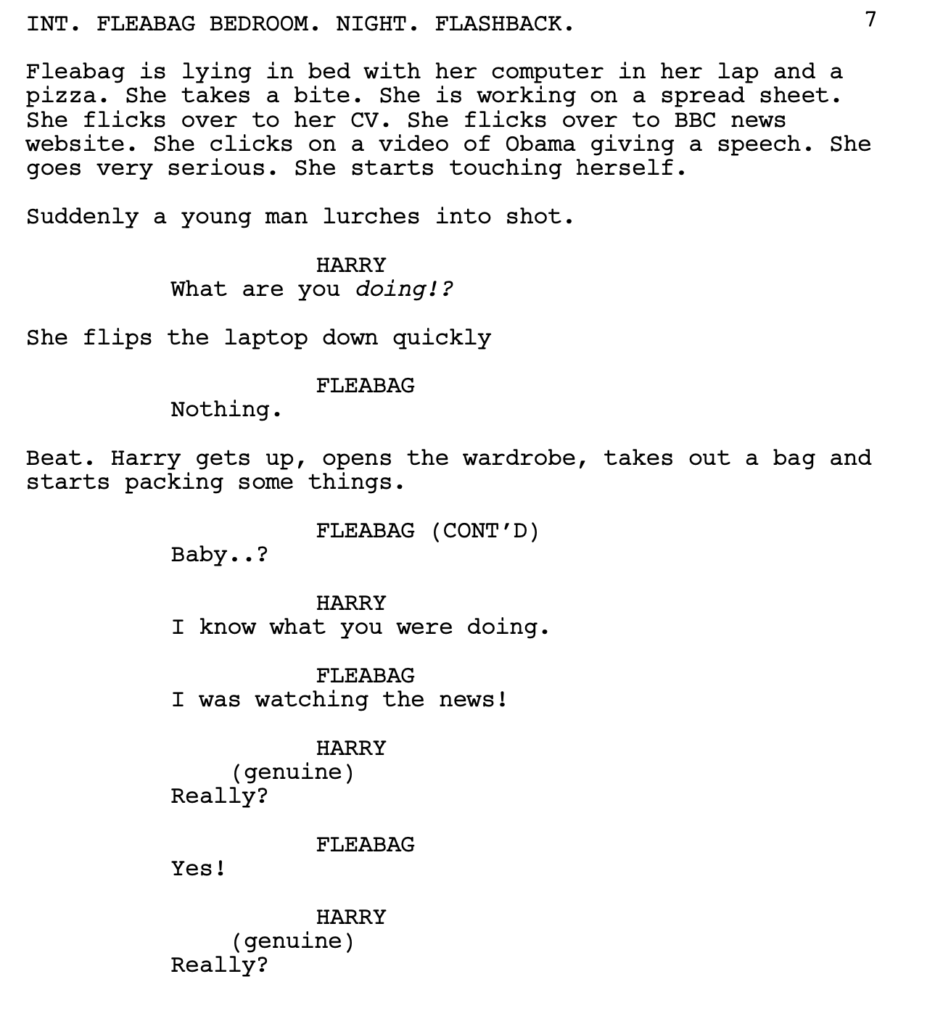
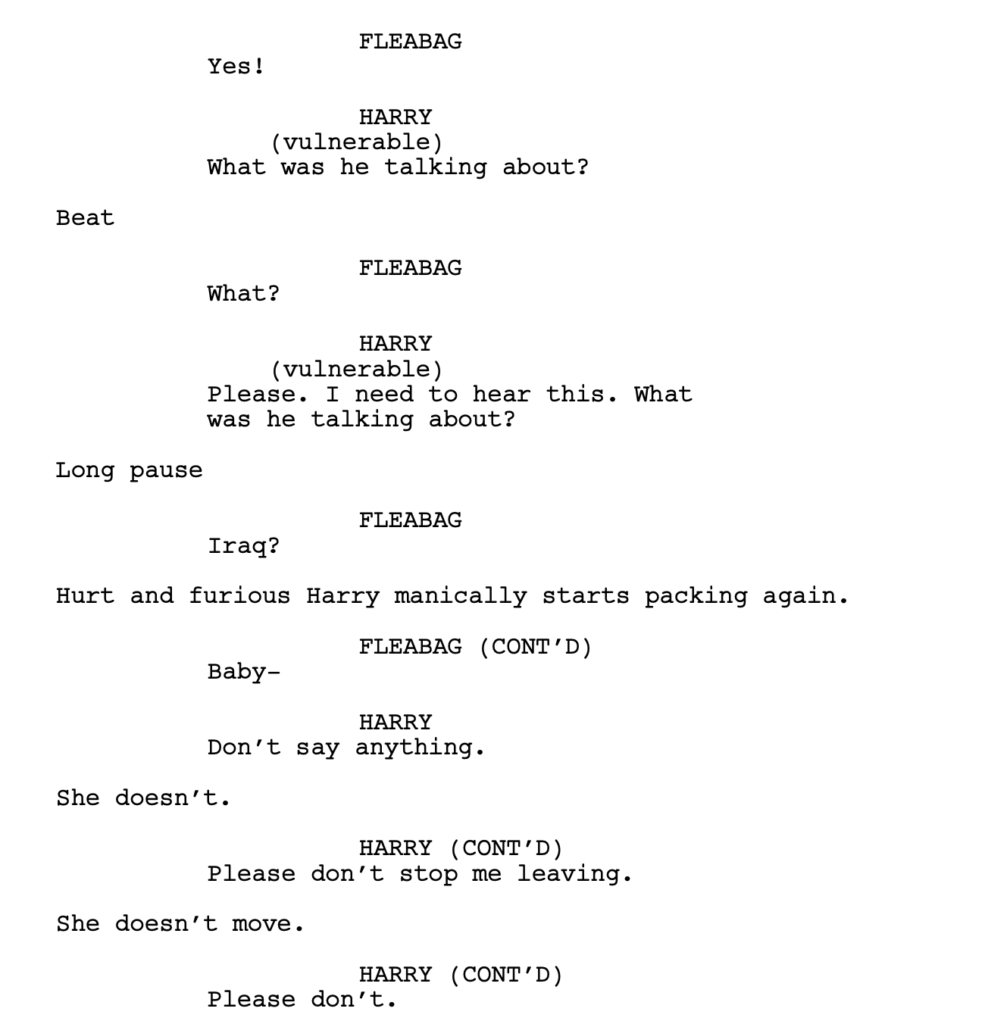
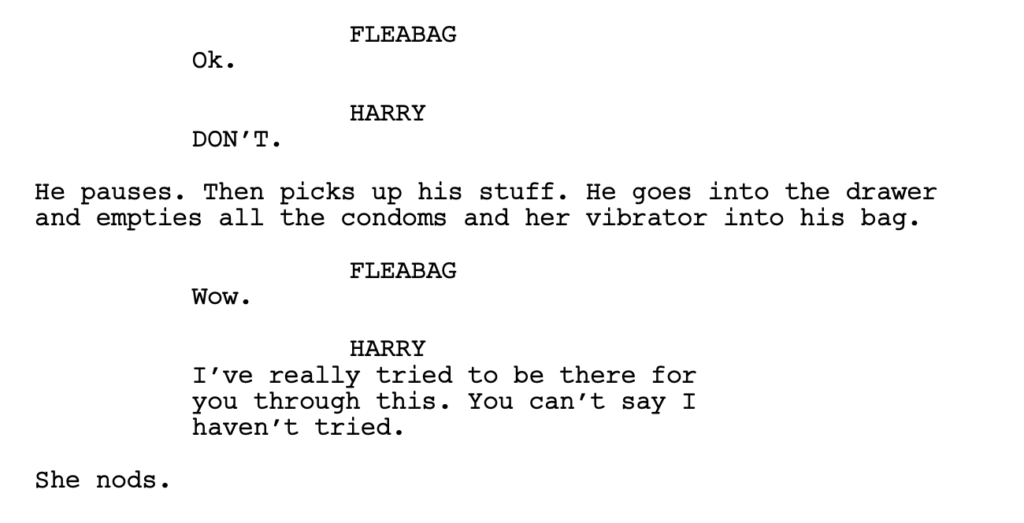
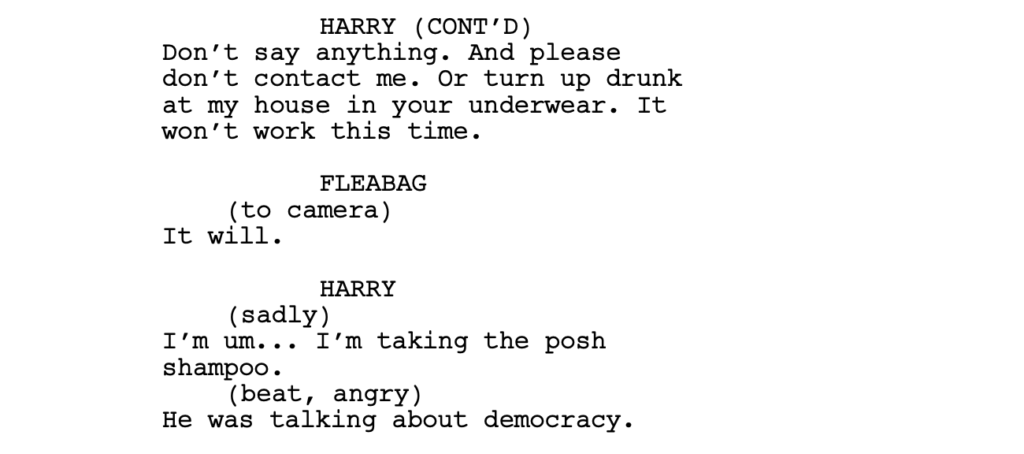
The scenario itself is so much more clever and unique. Who starts masturbating to a political figure’s speech? But it wasn’t just that. The boyfriend’s reaction clearly informs us that this has been an ongoing problem, which makes the interaction even funnier. And then we watch as she desperately squirms to try and save herself, which is always fun to watch. All of this is made even funnier by the fact that the previous scene has her meeting a guy, the guy asking if she has a boyfriend, and when she tells him, no, they just broke up, the guy assumes that the guy is the one who screwed it up. We then immediately cut to the above scene.
Anyway, getting back to It Was You.
The last line is Brandon asking Francis if his dating strategy works and Francis saying, “No it doesn’t, and I don’t know why.” An obvious punchline like this isn’t very funny because it’s not at all surprising. Francis informing us that a lousy dating tactic has lousy results is… expected, right? So where’s the joke? It would’ve been funnier if he’d told us that a lousy dating strategy actually worked great! So a line like, “Believe it or not, my success rate is about 80%.” Cause we’re not expecting that.
This is what’s hard about writing dialogue. We all think different stuff is good. We all think different stuff is funny. But one of my simplest criteria for objectively analyzing dialogue is, “Could this scene have been conceived of and written in ten minutes?” If so, the writer isn’t doing enough. This scene definitely feels like that.
You have to get into the reader’s head and ask what they’re expecting from this dialogue and try to outsmart them or keep coming back to the scene and trying to one-up the jokes in it. “Is this the funniest line I can use here? Is there something better?” Every rewrite, keep trying to top yourself with the jokes.
So why was that Fleabag scene so unique? How can you pull that off as a writer? I suspect that one of Waller-Bridge’s friends shamefully admitted to her, on a night out drinking, that she masturbated to the Prime Minister on TV once. And Waller-Bridge took that idea and said, what if the Fleabag character not only did that, but it was an ongoing problem in her relationship?
That’s how you build the framework for original funny situations. The problem most writers make is that they’re drawing from movies that they’ve seen instead of real life. So they’re just rewriting scenes that have already been written, which is definitely what this scene from It Was You felt like.
Unfortunately, I’ve run out of time to judge the rest of the script but I think it’s safe to say that you can guess what happens. There are a few fun scenes when the two ignorantly run into each other in real life. But the script can never overcome the amount of buy-in it’s asking for. I just couldn’t get past the anonymous dating app thing. Name me one person in the world, who isn’t blind, that uses dating apps without pictures.
[ ] What the hell did I just read?
[x] wasn’t for me
[ ] worth the read
[ ] impressive
[ ] genius
What I learned: Every time you write a scene of dialogue, I want you to imagine that dialogue posted here, on this site, in the cold naked light of day. Would it hold up? Are you mentally making excuses for it? If so, time to rewrite that dialogue, baby.

